Celebrating Our Fall Athletic Teams: Hard Work, Unity, and Honoring God
Each season, as athletic director, I take time to step back and reflect — on our teams, our coaches, players, and the goals that were set. This fall, not only did every team rise to meet those goals, they exceeded them.
At our Fall Awards Night, I shared a thought that has shaped much of my perspective this year:
“Learning to win is costly. Winning is hard. And once you’ve won, it becomes even harder to keep winning. Yet we continue to pursue victory because the reward is found in the journey — in honoring God with the gifts He’s given us, discovering what genuine teamwork looks like, facing adversity with courage, training both mind and body so we can trust the work we’ve invested, receiving faithful mentorship, and striving toward something greater than ourselves.”
This was our journey this fall…
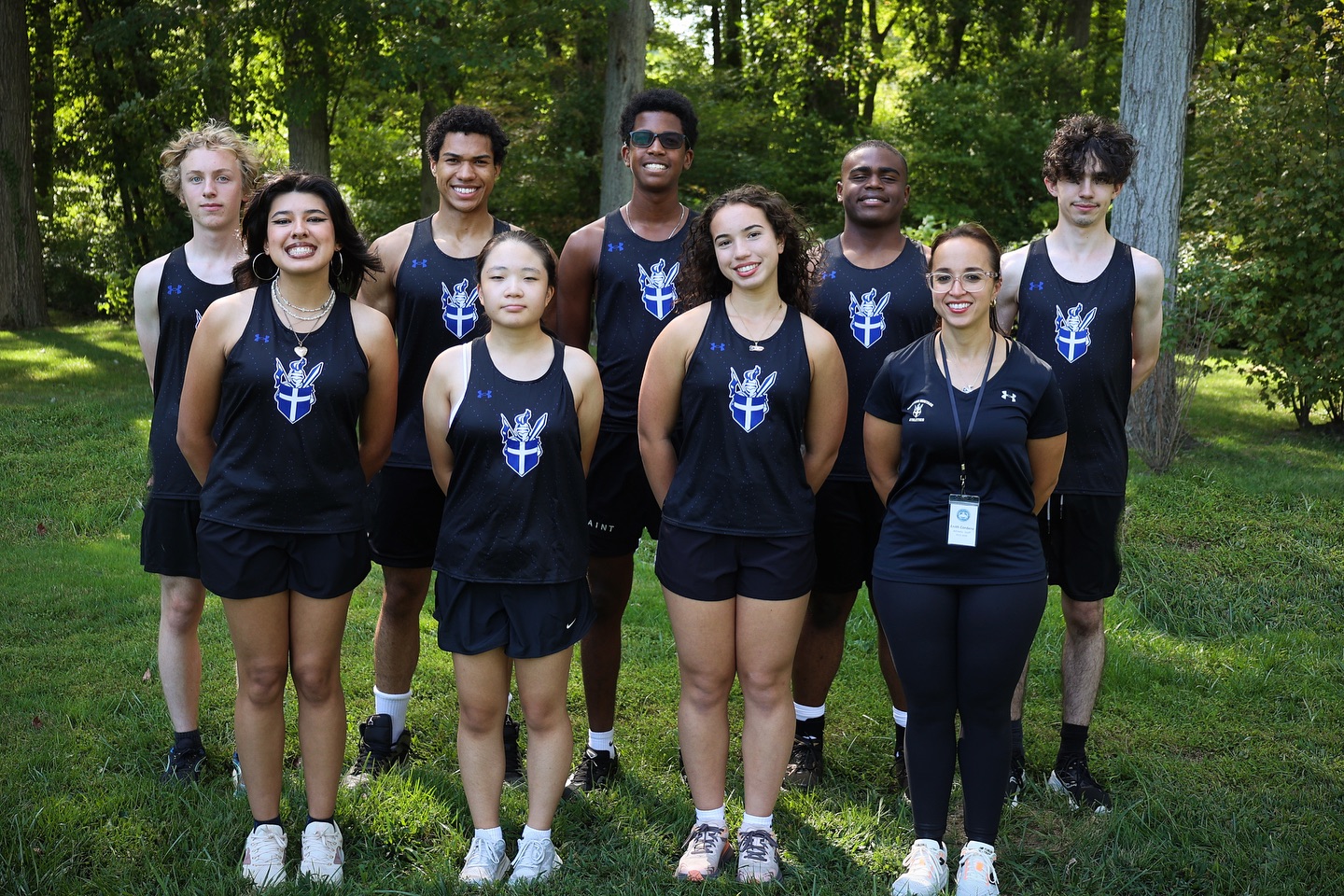
Cross Country
The Boys Cross Country team capped off a strong season with a 3rd-place finish in the HVAL Invitational. Malachi Hayes earned First Team All-HVAL honors after placing 5th overall at the HVAL Championships.

Girls Soccer
Girls Soccer finished with an impressive 9–5–2 record, won their first-round HVAL playoff game, reached the semifinals, and returned to the NEPSAC Tournament for the first time since 2019.
Individual recognitions included:
- First Team HVAL: Jemi Ndjadi, Laura Landru, Luiza Ribeiro, Grace Flowers
- First Team All-NEPSAC: Jemi Ndjadi, Luiza Ribeiro
- NEPSAC Honorable Mention: McKenna Haggerty, Laura Landru
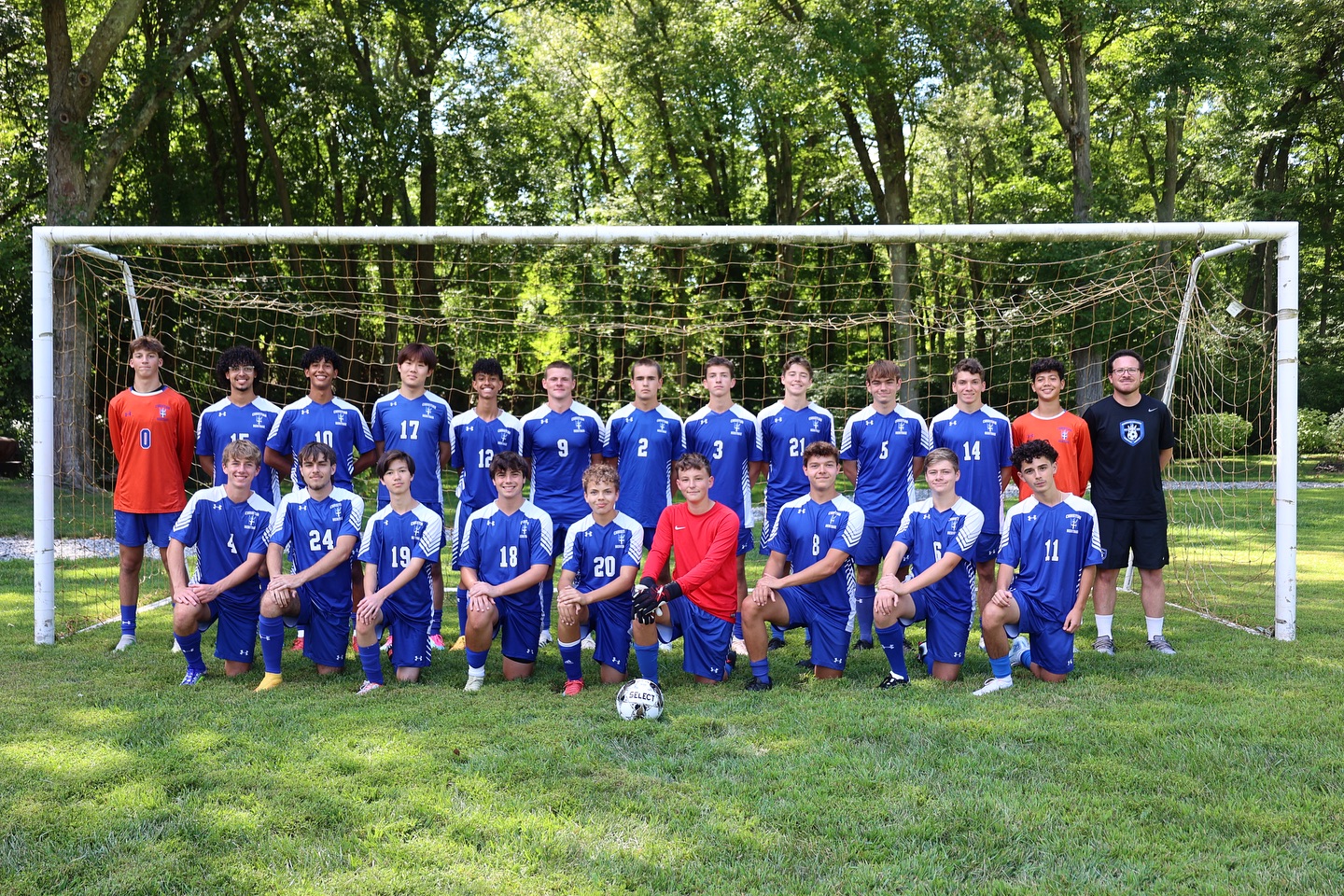
Boys Soccer
Boys Soccer also finished 9–5–2, their best record since 2019. They reached the HVAL Semifinals and competed in the NEPSAC Tournament for the first time in six years.
Individual recognitions included:
- First Team HVAL: Leighton Pelaccia, Esteban Sanclemente, Jack Allen, Eli Coburn
- First Team All-NEPSAC: Leighton Pelaccia, Esteban Sanclement
- NEPSAC Honorable Mention: Jack Allen, Eli Coburn

Girls Volleyball
Despite graduating many starters, Girls Volleyball returned with focus and determination, finishing 17–4, claiming their fifth straight HVAL Championship, and battling in a close five-set match in the NEPSAC Finals.
Individual recognitions included:
- First Team HVAL: Emma Beers, Ava Austin
- First Team All-NEPSAC: Emma Beers, Ava Austin
- NEPSAC Honorable Mention: Cheyenne Petion, Ava Sheckfee
Fall Highlights
- A Homecoming sweep over Wooster in Girls Soccer, Boys Soccer, and Volleyball
- Girls Soccer, Boys Soccer, and Volleyball all qualified for the NEPSAC Tournament — the second time in school history and the first time since 2019
The CHS athletic teams had an outstanding fall season, with incredible determination, character and sportsmanship. We are looking forward to a great winter season of basketball! Go Kingsmen!

Coach Katie Levis is in her fourth year as the Athletic Director at CHS and also serves as the Varsity Girls Lacrosse Coach. Before taking on these roles, she spent four years as a classroom teacher and contributed to the volleyball and basketball programs as a coach. With coaching experience spanning middle school, high school, and college levels, Coach Levis has also worked in athletic departments at previous schools.
Student Reflections From Summer Internship
My name is Eli Coburn and I am a Junior here at CHS. This past summer I had the opportunity to have a summer internship set up through our CHS Academic and College Counseling office at Medtronic. Medtronic is a global healthcare technology company that develops, manufactures, and distributes medical devices and therapies that is located in North Haven, CT.

During my internship at Medtronic, there were several challenges that I faced and different moments that taught me different traits about myself. I gained valuable exposure to working in a corporate setting, working on a team within a larger company, and more specific insights into the biomedical field.

Throughout my internship, because the safety training would have taken up a significant portion of my time, I was not able to do as much hands-on work as I was expecting and hoping for the various tests that were being conducted at Medtronic. I did a lot of observing and asking questions rather than active work. It was still very interesting and educational to see how the tests were conducted and to have my questions answered about the reason and function of the tests.
I was able to find ways to be helpful during various tests, especially one where another intern was dissecting arteries from sets of kidneys. I helped with the measuring and storing of the arteries, and it felt good to be able to help. I found my desire to be of assistance and my willingness to be flexible and adjustable to different tasks very useful during this internship. I think that these traits will be useful for me during my career, as well as eventually taking charge and doing more myself.
Secondly, as silly as it sounds, going to several meetings across the two weeks was very helpful for me. It was good for me to get some exposure to corporate life, which I’ve learned involves many meetings! Wherever I end up in the future, it is likely that I will have to go to meetings, so getting some early experience with them was very rewarding for me.

Throughout the internship, getting exposure to different aspects of having a job was one of the most rewarding parts of the summer seminar. In one of the team meetings that I attended, one of my colleagues was explaining to the team how she had been assigned to a project with very little prior information. There were several very expensive pieces of equipment with little records about them, no labels, and the person who had worked with this equipment previously had left the company. This showed me the importance of communication and documenting your research, as this project was lacking them and therefore very difficult to complete. It is very important to document what you do so that you or others can go back and look at your research at a later point. Good communication is crucial for a functioning company, as demonstrated here.
Although different from what I was expecting, the internship this past summer was a great experience for me. I am so grateful for the opportunity to be able to gain this experience and this exposure to work life. It has helped me a lot when thinking about my future and what type of job and field I may be interested in the future. I had a lot of fun and am very glad that I decided to do the summer seminar internship program offered through our Academic and College Counseling office this year.
Empowering Voices: Upper School Students Develop The Art of Preaching

Can you imagine graduating from high school with the confidence that you not only know what you believe, but also know how to effectively share it? At Christian Heritage School we train teenagers to know and love the Word of God, apply it to their lives, and preach it winsomely to a world that needs it. Our hope is that they will be able to start living out the Great Commission long before they become adults. Most of the best preachers we can think of started formal training as adults. Imagine what the church could look like if we were to equip teenagers to read the Bible and share it with others.


To this end, we teach our students how to preach starting in 6th grade. Each year, students are taught the basics of exegesis and how to understand the Bible in context. They are taught how to write a sermon that is Biblically accurate and applicable to the students in their classes. Each year we build on the fundamentals of preaching that they have been taught. By the time they are in high school, they can effectively exegete and apply scripture in a way that brings the Word of God to life.

Sadly, in our culture, both teens and adults alike are afraid of public speaking. By training our students how to read the Bible in context and then giving them both the tools and the opportunity to communicate what they have learned, they are becoming speakers who boldly proclaim the name of Jesus. Not only are students able to preach in class, but they are also given the opportunity to preach in chapels, for both the lower and upper schools. What an encouragement it is to have our 3rd graders see an 8th grader preach a first-person narrative of the Christmas story.

Our students are not only equipped but genuinely very good at preaching. Our Bible faculty is regularly amazed at the quality of preaching that is coming from students: 8th graders who can modernize a parable that will bring you to tears, a 9th grader who exegetes a passage in a way that brings to life what you’ve never noticed before, or an 11th grader who gets choked up sharing all that God has done in his life.
It is a privilege to teach students the Word of God, but my greatest joy at CHS has been helping students find their voice and preach!
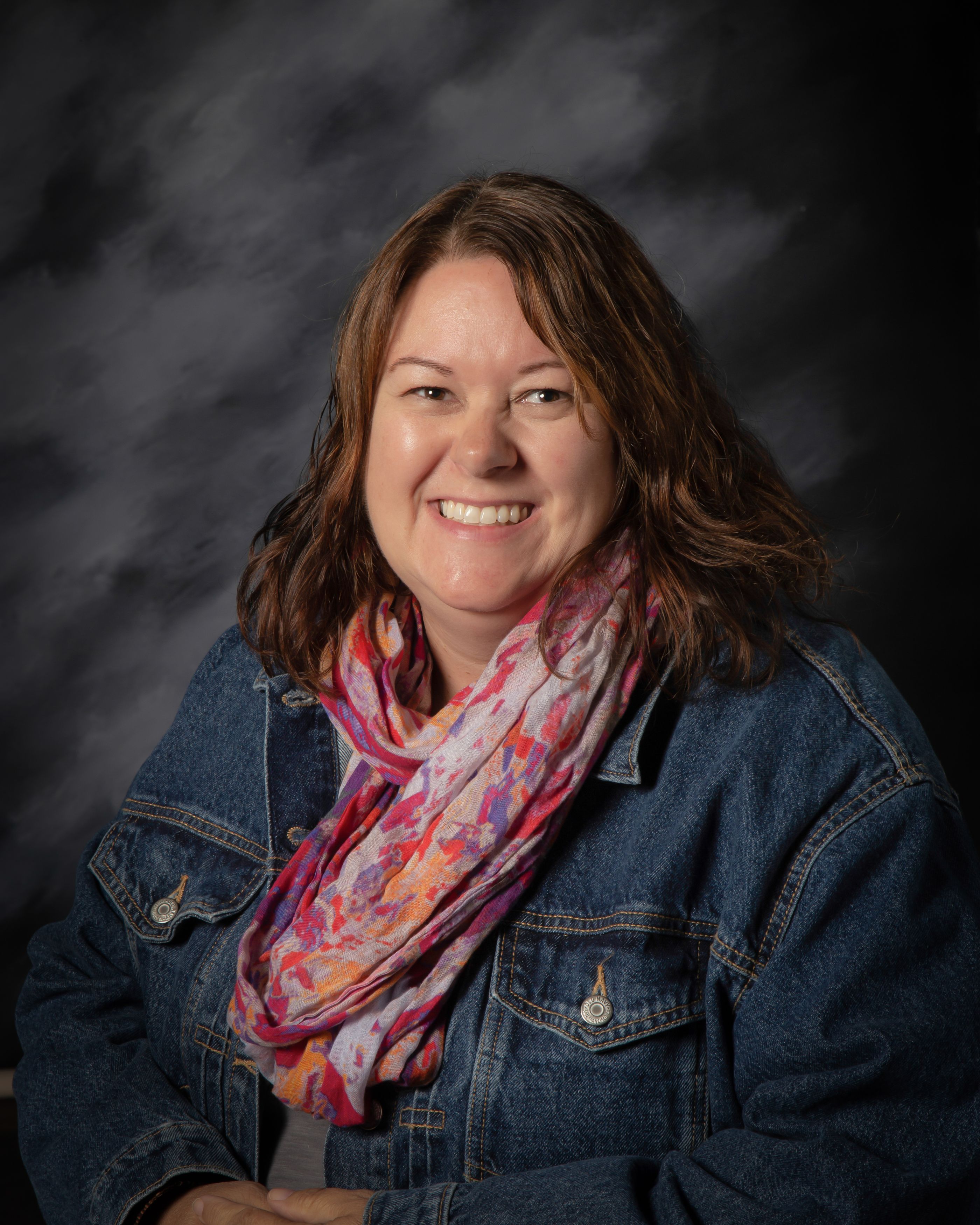 Mrs. Jennie Higenyi is our Upper School Bible Department Head. She received a Bachelors of Psychology and Pastoral Ministry from Nyack College, and a Masters of Divinity and a Masters of Preaching from Gordon Conwell Theological Seminary. Jennie has worked as both an Associate Pastor and a Preaching Pastor, and began her teaching career as a Professor of Pastoral Ministry. She has lived as a Missionary both in Italy and in Africa. This is her fourteenth year working at CHS, and she teaches 7th, 8th, and 11th grade Bible, and 12th grade Syracuse University Presentational Speaking.
Mrs. Jennie Higenyi is our Upper School Bible Department Head. She received a Bachelors of Psychology and Pastoral Ministry from Nyack College, and a Masters of Divinity and a Masters of Preaching from Gordon Conwell Theological Seminary. Jennie has worked as both an Associate Pastor and a Preaching Pastor, and began her teaching career as a Professor of Pastoral Ministry. She has lived as a Missionary both in Italy and in Africa. This is her fourteenth year working at CHS, and she teaches 7th, 8th, and 11th grade Bible, and 12th grade Syracuse University Presentational Speaking.
Beyond the Music: Developing Leaders Who Worship in Spirit and Truth
Beyond the Music: Developing Leaders Who Worship in Spirit and Truth
All throughout scripture, praise is both commanded and modeled as a way of giving glory to God. Psalm 95:1-2 says, "Come, let us sing for joy to the Lord; let us shout aloud to the Rock of our salvation. Let us come before him with thanksgiving and extol him with music and song." It is no secret that God created humanity to worship Him, and on the student worship team, exalting Christ is our greatest priority. Through the worship team at Christian Heritage, students grow in theological literacy, they cultivate creativity, and they learn how to lead themselves and others in adoration to the Father.
Through music, we strive to proclaim the truth of God with biblical accuracy. As Matt Boswell writes, “It is (our) responsibility to shepherd the congregation into the green pastures of God-centered, gospel-centered songs and away from the arid plains of theological vacuity, meditations on human experience, and emotional frenzy”[1]. As students craft worship sets and prepare to play, sing, and lead, they are challenged to consider the words and messages of each song. When selecting music, some questions we ask ourselves are: What gospel truth is being conveyed in this song? Is this song more about me and my feelings than it is about Christ and His holiness? Are there any words or phrases in this song that might be confusing or easily misinterpreted? On this team, students understand that in order to grow as worship leaders, they must become students of scripture.
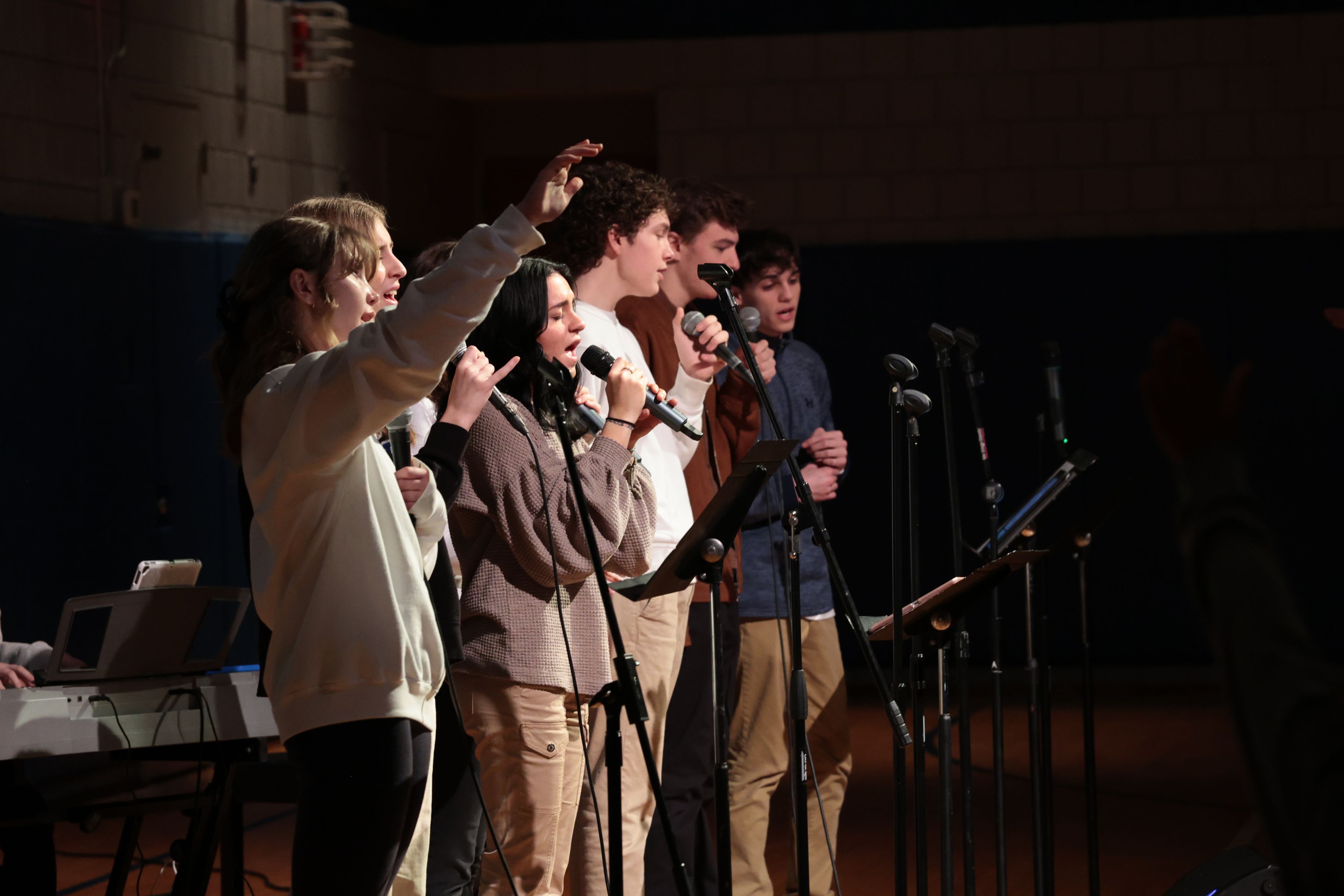
One morning, as the team was preparing to rehearse, a student started playing a riff on the bass that mimicked a tune from an oldies song. Another student darted over to the drums and started tapping along. Others began singing in harmony, and quickly the rehearsal space was echoing to the sound of Ben E. King’s “Stand by Me”. There is an impulse inside all of us to create. This is because God, the creator of all things, made mankind in His image (Gen 1:27; John 1:3). On the worship team, we encourage creativity by fostering an environment where permission is given to experiment, try new ideas, and learn from each other. Just last week, a middle school student had the idea to merge two songs together, flowing without pause from one chorus to another, treating two different songs as one. The same day, a high schooler saw a creative opportunity to let the voices minister without instruments. Unrehearsed, she signaled to the rest of the band to stop playing, and the room was overcome by the angelic sound of over one hundred voices lifted heavenward. Creativity inevitably draws us closer to our Creator, and we mirror His very nature when we make space for creative expression.
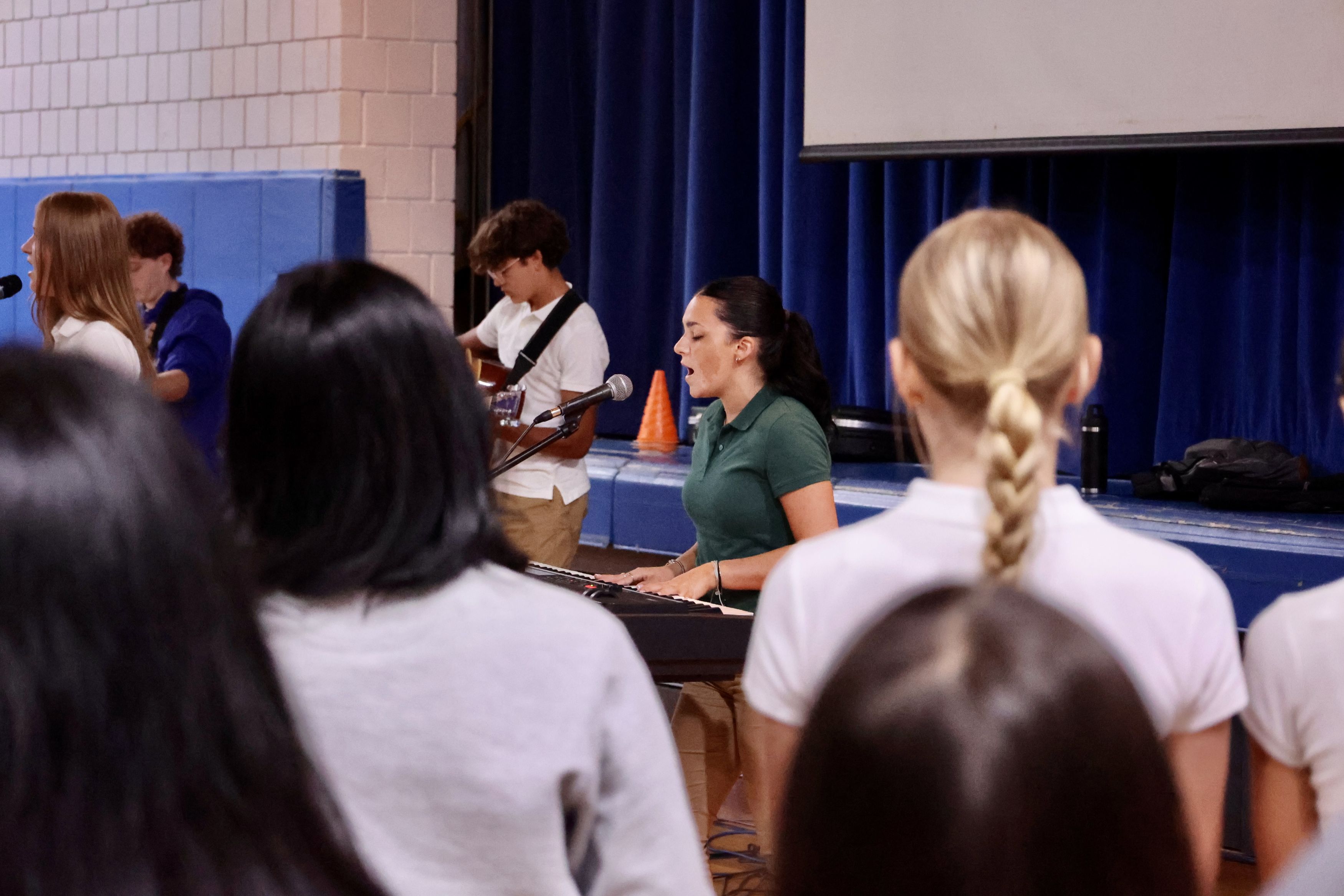
One of the most well-known worshipers in the Bible was David. Throughout the Psalms he commands himself to praise and stirs up adoration to God. We see this in Psalm 103:1 when he says, “Praise the Lord, my soul; all my inmost being, praise His holy name”. On the worship team, we recognize that in order to lead well, we must first know how to lead our own hearts in praise. We practice this by remembering His goodness and regularly reflecting upon what He has done and is doing in our lives. Cultivating a greater personal life of worship enables us to lead others well.
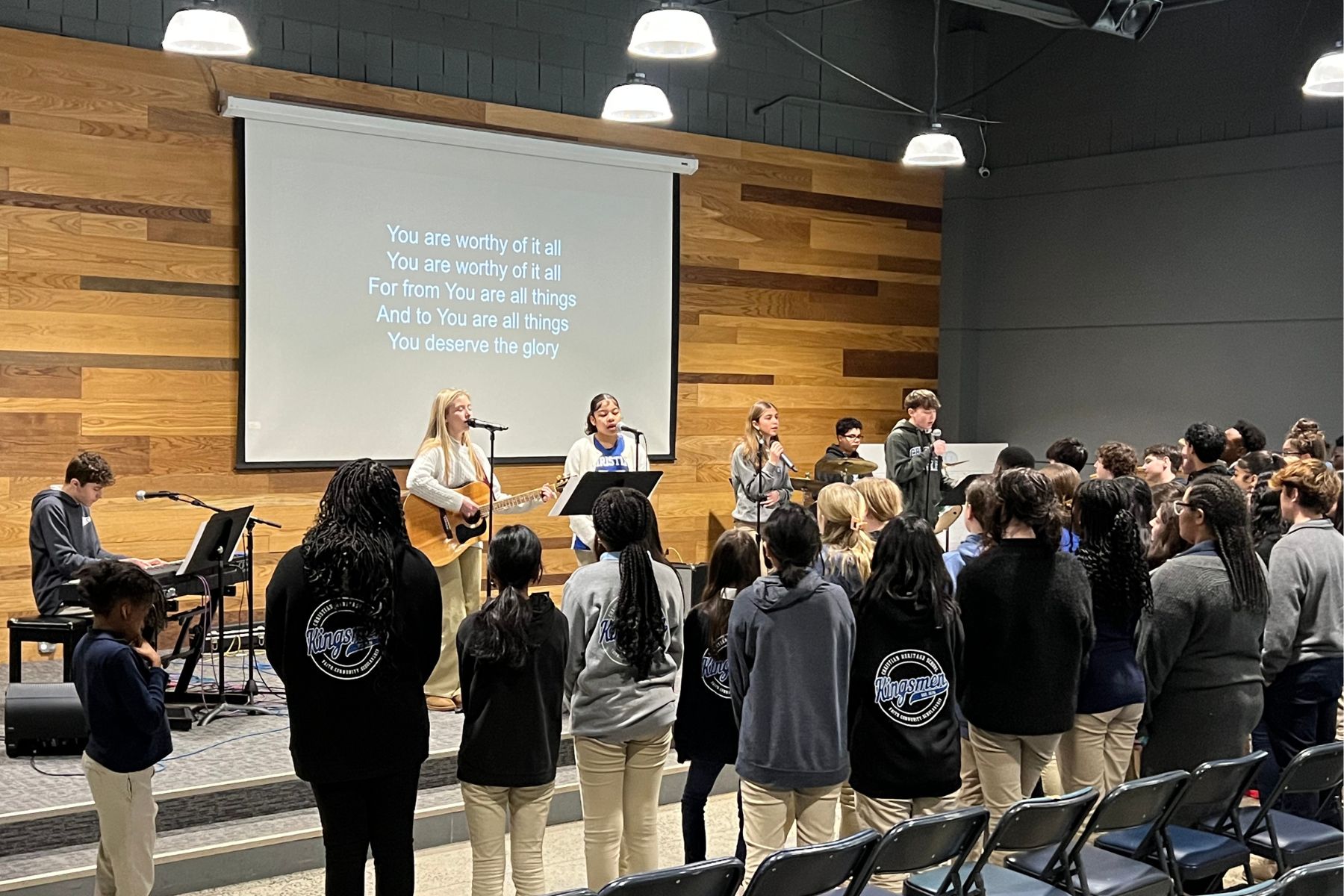
Students also learn that leading is a privilege, and we stress the importance of preparation as a way to honor God and each other. Preparation on the worship team is both practical and spiritual. We work on how to prayerfully and strategically build worship sets. We discuss ways that each instrument and voice can support and strengthen different songs. We take time to rehearse our parts. And we practice how and when to lead a pastoral moment, whether it’s sharing a scripture or word of encouragement, giving context to a song, or leading a prayer. Psalm 33:3 instructs us to sing and play skillfully before the Lord. When we take time to plan and prepare, we give God our best, and we limit distractions that might hinder others’ ability to fully engage with the wonder of Christ.
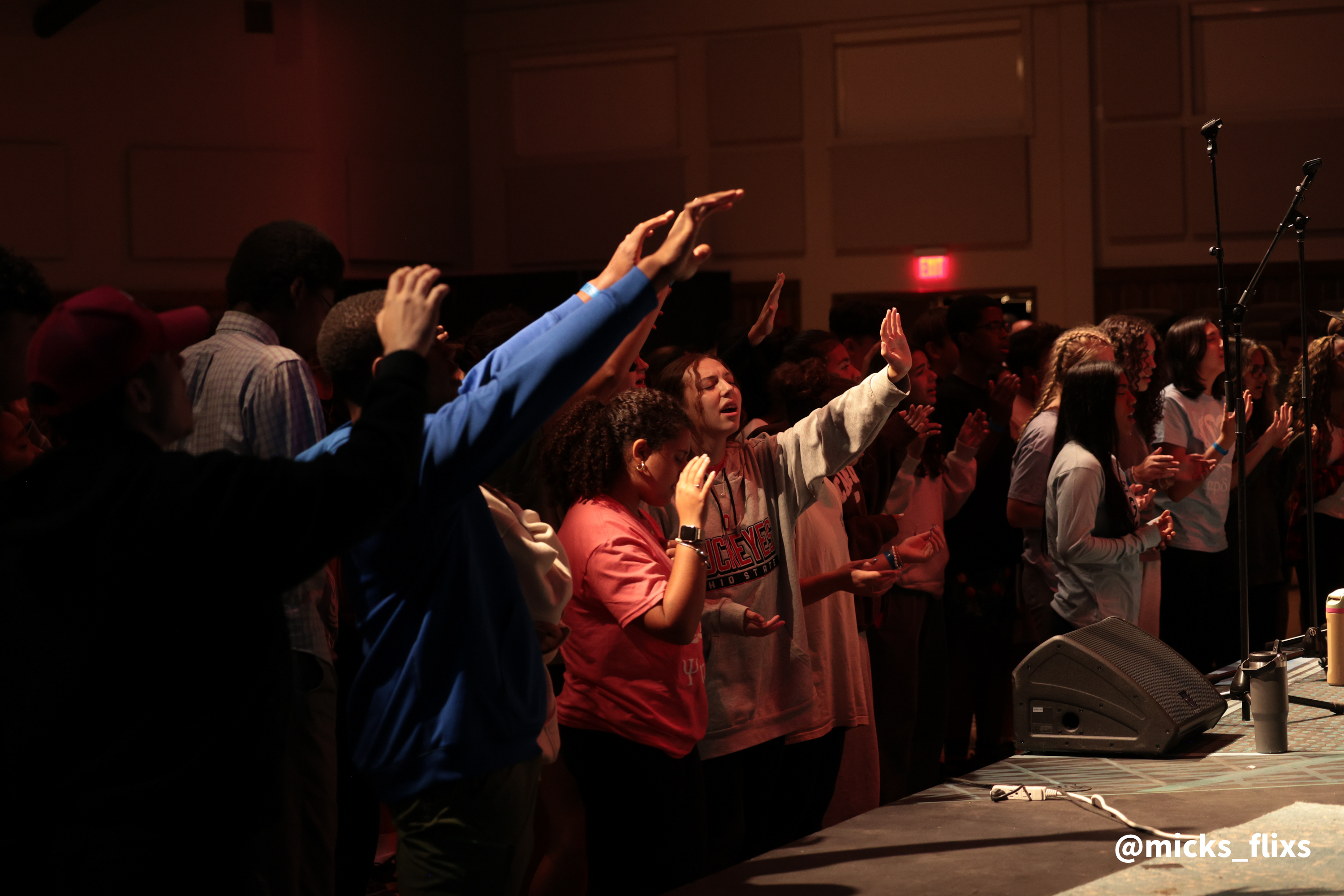
“Sing to the Lord a new song, for He has done marvelous things!” (Psalm 98:1). While we know that worship extends far beyond a musical experience, there is something undeniable that happens when we sing to Him. The life-changing power of God is released into our lives when we praise (Acts 16:25-26; 2 Chronicles 20:15-22), and our focus is shifted away from ourselves and onto something bigger. We cannot help but be reminded of who God is and what He has done when we sing. Through the worship team, students learn how the truth of the gospel, their creativity, and their affection for Jesus inform the way they lead themselves and others in praise. As we develop worshipers here at Christian Heritage, my prayer is that their lives would be shaped by the truth of Christ’s extravagant love; all glory belongs to Him. “Sing to the Lord, for He has done marvelous things!”
[1] Boswell, Matt, ed. Doxology & Theology: How the Gospel Forms the Worship Leader. Nashville, B&H Publishing Group, 2013. 233 pp.
Life Application Bible: New International Version (2011). Grand Rapids, MI: Zondervan.
 Chelsea serves as the Upper School Worship Team Coordinator. She is a CHS alum (2009) and earned her bachelor’s degree in Music Industry. Chelsea is married with two young children, and leads worship and writes music with her friends at Vox Church. Chelsea is passionate about seeing the beauty and glory of God displayed through creative expression.
Chelsea serves as the Upper School Worship Team Coordinator. She is a CHS alum (2009) and earned her bachelor’s degree in Music Industry. Chelsea is married with two young children, and leads worship and writes music with her friends at Vox Church. Chelsea is passionate about seeing the beauty and glory of God displayed through creative expression.
The Leadership Cohort: Learning to Lead Well
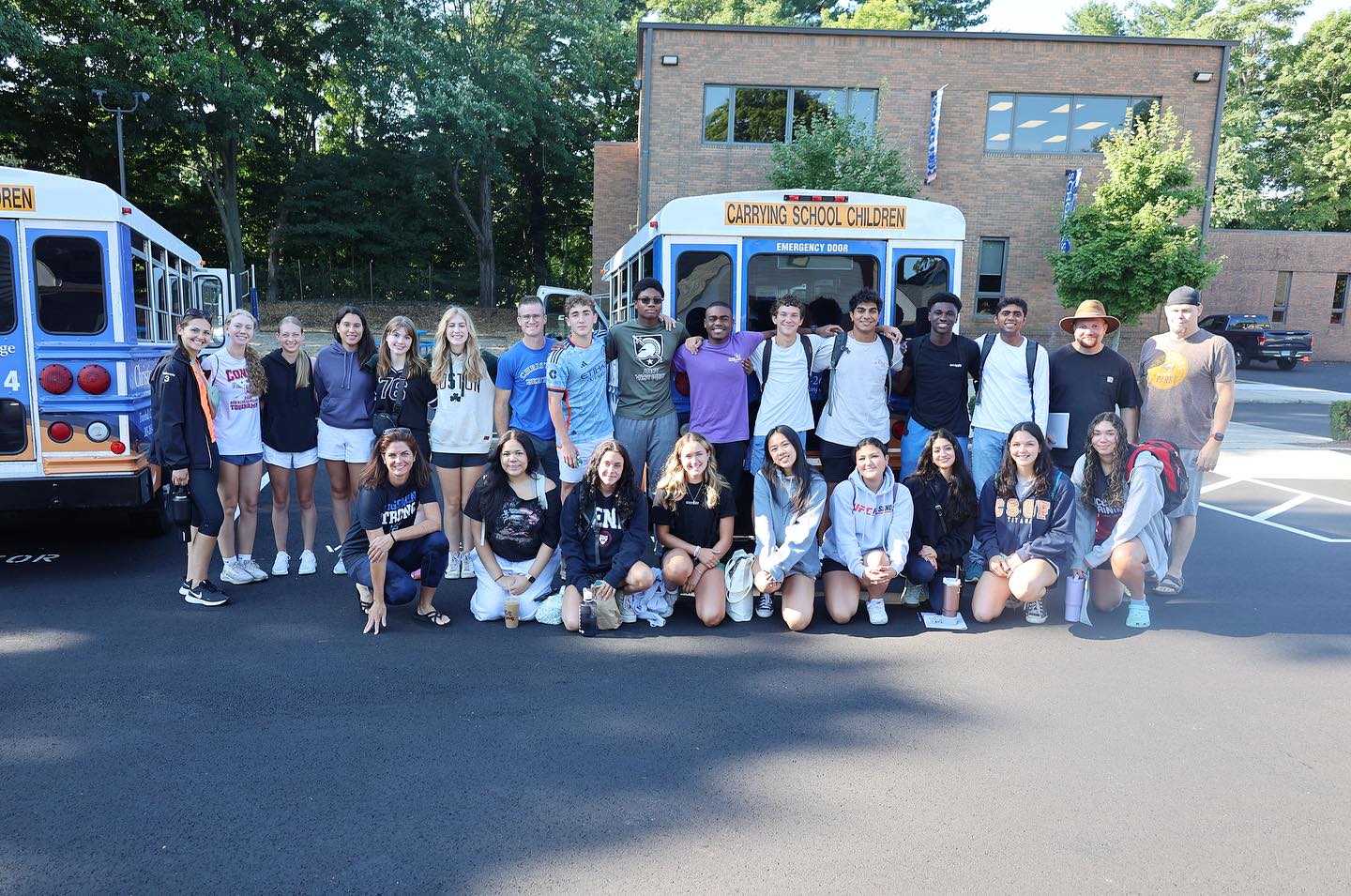
Leading well is hard.
Throughout the years, I’ve come to realize this more and more. Within the many different roles I’ve had, it is tempting to think, “I could do it better.” However, when we take on a leadership role, it’s actually one of the hardest things to do well. You can’t lead if others don’t follow, it can be very lonely and when you're on the outside, decisions seem as if they are very clear, but in the midst, it can be very muddy.
About 5 years ago, I was coaching some teams at CHS and realized that my captains struggled with knowing how to lead well, and I knew we were not the only team facing this. Chappy (Mark Persson, CHS Chaplan) and I were talking about this one day in my 4th grade classroom. As it turns out, he was drawing the same conclusions with other student communities. Out of this need, came the beginnings of the vision for what is known as the Leadership Cohort.
The Leadership Cohort is a group of students who have a desire to learn to lead well in many different areas of school and life. It is the hope of the Cohort to help students grow into leaders wherever they are placed. They work to lead out of their giftedness while understanding that the Bible provides the guidebook. Many people equate leading with a position, but the reality is we are called to lead wherever we are placed in many different ways. Matthew 20:26 and 28 says, “...But whoever would be great among you must be your servant….” and “...even the Son of Man came not to be served but to serve and give his life as a ransom for many.”
The Leadership Cohort believes that in learning to lead, students need to be poured into and given opportunities to live it out.
The first is the need to be discipled. Having adult mentors pour into students with a focus on leading from a biblical perspective is imperative for growth. Students need to have a safe place to ask questions, reason through making decisions and especially learn how to engage in conflict with forgiveness and restoration as the goal. We do this through morning meetings and lunch meetings with small groups.
The second is a need to serve. This year, the group has partnered in places all around the school to provide support and leadership. This included working with the student government to assist in providing the school with excellent and engaging activities. The idea was NOT to create MORE but to create BETTER. We do so many great activities at the school, why not join in with what we are already doing.
The final focus is to lead in community. Getting out of our comfort zones, building new relationships, and gaining new experiences help our students to grow and learn new things about themselves and others. Incorporated into this is a retreat involving activities that might be uncomfortable, such as hiking, swimming, or rafting. It also includes solitude, teaching by our leaders and worship. When we are challenged physically, emotionally and spiritually, it gives us an opportunity to be vulnerable before God and others, creating space to grow as God would have us.
This vision never fully matches reality. But in many ways, reality is much sweeter. If we expect perfect leaders, we get self-righteousness. What we are working to develop are repentant leaders. Because, when we fall and get back up by God’s grace, we rise more humble and more bold than before.
Leading well is hard, but working to lead well is well worth it.

This is Coach Katie Levis’s third year in her role as Athletic Director, and she is also the Varsity Girls Lacrosse Coach. Prior to that, she was a classroom teacher at CHS for 4 years, as well as coaching in the volleyball and basketball programs. Coach Levis has coaching experience at the middle, high school and college level along with working in an athletic department at previous schools.

